Despite birth control becoming a taboo subject in Indian politics and the public discourse after the excesses of the Emergency (1975-77), for the past 48 years the Delhi-based PFI has been actively propagating and devising plans and strategies to decelerate India’s population growth momentum - Dilip Thakore & Indranil Banerjie
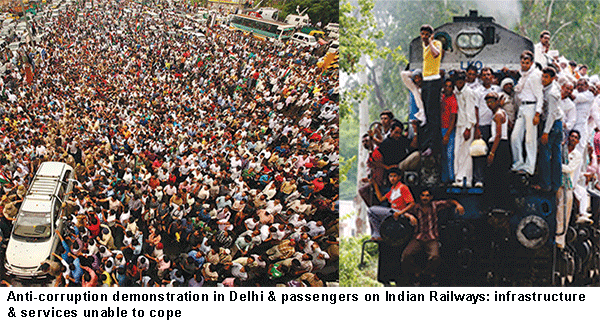
Birth control or family planning — it’s politically more acceptable euphemism — are words that have almost disappeared from the public discourse in 21st century India. Neither the country’s self-serving politicians, nor its effete intelligentsia seem ready to acknowledge that public infrastructure and services such as health, education, social security schemes etc, have failed to cope with population growth.
Despite the cosmetic efforts of successive governments at the Centre and in the states for the past seven decades, Census 2011 reported a decadal population growth rate of 17.65 percent. Although the grandly titled Union ministry of health and family welfare issues periodic statements to the effect that the country is moving towards population stabilisation, i.e, the number of children per parental couple is moving towards two, the plain unvarnished truth is that for the past seven decades, the country’s population growth has averaged an exponential (compounded) 2.02 percent per year. Consequently, the national population which was 360 million in 1951 shortly after India wrested its independence from foreign (British) rule and adopted Soviet-style central planning as its socio-economic development model, has tripled to 1.21 billion according to Census 2011. Therefore, despite its massive subcontinental size (3.28 million sq. km), the country which covers 2.4 percent of the world’s land area, is experiencing a huge challenge in supporting 18 percent of the world’s population.
Indeed, the truth is that the country’s resources although vast, are unable to cope with this runaway growth in the number of citizens, a situation exacerbated by post-independence India’s adoption of the Soviet-inspired public sector-led socialist economic development model, which has frittered away the national savings and other resources. Moreover, within the placid groves of the academy and woolly-headed intelligentsia (including the media), there’s hardly any meaningful discussion on ways and means to control the country’s explosion of numbers which reportedly adds the equivalent of one Australia (pop.19 million) to the population of a nation in which the average per capita income is a pathetic $1,710 per year, compared with $57,638 in the US, $8,124 in China and $3,570 in Indonesia.
Historians and sociologists attribute conspicuous political and establishment silence on this critical issue severely hindering the national development effort, to the ham-fisted extra-constitutional intervention of Sanjay Gandhi (1946-1980) in the country’s official family planning programme — reportedly the first worldwide — during the infamous internal Emergency (1975-77). Proclaimed by then Congress party leader and prime minister Indira Gandhi, the Emergency was a dark period in India’s history when leaders of all opposition parties were imprisoned, nationwide media censorship was imposed and Part III of the Constitution which enshrines the fundamental rights, was suspended by the government.
During this 19-month period, Sanjay Gandhi and lumpen elements who were co-opted en masse into the Youth Congress, unleashed a reign of terror forcing vasectomies and tubectomies on millions of bottom-of-pyramid citizens, especially of the Muslim and Dalit minority communities. These forcible surgeries became a major political issue of General Election 1977, unexpectedly called by Mrs. Gandhi in which the Congress party was routed and the prime minster and her son were defeated in their parliamentary constituencies. Since then ‘family planning’ has become a taboo subject in Indian politics and the public discourse.
On the contrary, to cover up their acts of omission and commission especially open, continuous and uninterrupted neglect of providing sufficiently for universalisation of primary education — proven the most effective contraceptive worldwide — post-emergency India’s political class and intelligentsia have transformed its gigantic population control failure into a convenient ‘demographic dividend’. The country’s huge 650 million child and youth population is being touted as a national endowment which will enable India to dominate the world in the new millennium.
However, it’s pertinent to note that all institutions and intellectuals aren’t party to this great betrayal of the national interest. For the past almost 50 years, the Delhi-based Family Planning Foundation (FPF, estb. 1970), a non-government organisation (Ngo) promoted by “socially committed and philanthropically inclined” industry leaders J.R.D. Tata (1904-1993), chairman of the Mumbai-based Tata Group of companies and Dr. Bharat Ram (1914-2007), chairman of the Delhi-based DCM Group, north India’s premier business conglomerate (right until the mid-1980s) with “dollar for dollar” initial support from the US-based Ford Foundation, has been actively propagating and devising plans and strategies to decelerate India’s population growth momentum. The objective of the foundation is to “supplement and complement the efforts of the government for family planning and also galvanise voluntary action through meaningful support activities”.
However, with population control and family planning tagged as taboo in the political and public discourse after the Emergency, even leaders of Indian industry who should have known better, lost interest in the national family planning programme. In a brief history monograph of the foundation written in 2016, Radhika Ramasubban, an alumna of Mumbai University and currently an independent development consultant and advisor, writes that through the 1980s and until his demise in 1993, J.R.D. Tata was an unheeded voice in the wilderness and had little success in persuading fellow captains of industry to contribute to the depleted coffers of the FPF, which was kept afloat with the monetary ballast of the Tata Group and rent income from one of two buildings in Delhi gifted to it by the Ford Foundation, with the other serving as its office.
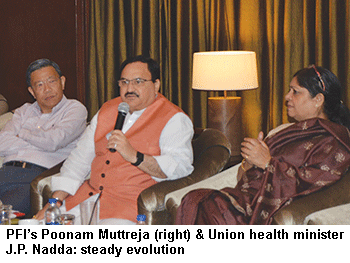 The impact of the forced sterilisation campaign of the Emergency is much greater than has been reported in the media. For 30 years, the Central and state governments failed to introduce any new contraception innovations such as injectables, the morning after pill, and implants into the country’s official family planning programme, while neighbouring countries including Sri Lanka, Bangladesh and Bhutan adopted them with excellent results,” says Poonam Muttreja, the Delhi-based executive director of the Population Foundation of India (PFI), the new name adopted by FPF in 1993.
The impact of the forced sterilisation campaign of the Emergency is much greater than has been reported in the media. For 30 years, the Central and state governments failed to introduce any new contraception innovations such as injectables, the morning after pill, and implants into the country’s official family planning programme, while neighbouring countries including Sri Lanka, Bangladesh and Bhutan adopted them with excellent results,” says Poonam Muttreja, the Delhi-based executive director of the Population Foundation of India (PFI), the new name adopted by FPF in 1993.
A psychology graduate of Delhi University with a Masters in public administration from the John F. Kennedy School of Government of Harvard University, USA, Muttreja has invested huge wealth of knowledge and experience into PFI since she was appointed executive director of the foundation in 2010. Starting her career as a social activist with the globe-girdling Ashoka Foundation (1979-81), she co-founded Dastakar, a traditional crafts Ngo where she served as executive secretary (1981-83); promoted and served with the Society for Rural, Urban and Tribal Initiatives (1983-85); served as programme director at the Coolidge Center for Environmental Leadership, Cambridge, USA (1986-91), and back in India established the India office of the globally renowned US-based John D. and Catherine T. MacArthur Foundation and served as its country director (1995-2009), prior to being appointed executive director of PFI eight years ago.
“The change of name of FPF to Population Foundation of India which was unanimously approved at a full meeting of the governing board chaired by J.R.D. Tata on March 30, 1993, was tacit acknowledgement that the organisation needed to move beyond research, advocacy and propagation of direct family planning methodologies to education of the people — particularly women — about the personal, familial and societal advantages of planned parenthood. Since then, PFI has steadily evolved into an Ngo which propagates women’s rights and empowerment as prerequisites of a national population stabilisation programme. We have also ventured into broadcasting critically important messages on preventing child marriage, sex selection, and violence against women, empowerment of women, nutrition and spacing between births to the public through television and new technologies, particularly the interactive voice response system and social media. In 2014, we produced a Hindi language television serial titled Main kuch bhi kar sakti hoon (‘I, a woman, can achieve anything’) which has proved very successful in reaching our message to over 400 million people countrywide. MKBKSH was directed by the renowned film and theatre director Feroz Abbas Khan and guided by Prof. Arvind Singhal, a global expert on entertainment education. Season 2 of the serial gained further popularity with the introduction of Farhan Akhtar as its sutradhaar,” says Muttreja.
With PFI having recovered its momentum and raising its public profile by venturing into popular television broadcasts by the government owned Doordarshan (which although scorned by urban television audiences is widely viewed in entertainment-starved rural India ill-served by private cable and dish television companies), this Ngo (annual budget: Rs.20 crore; headcount: 70) has got its act together and evolved into a multi-divisional organisation with each vertical — led by highly experienced and qualified professionals — providing valuable support services to realise PFI’s organisational objective of population stabilisation through women’s education and empowerment.
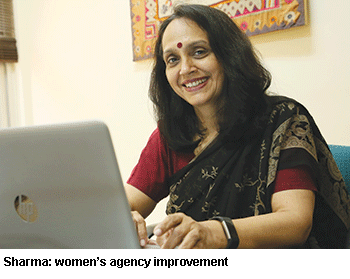 For instance, in her capacity as director (programmes), Sona Sharma, an alumna of M.S University, Baroda who acquired valuable advertising and communications experience with the best-seller newspaper Dainik Jagran (1991-95), and social causes know-how with the USAID-promoted State Innovations in Family Planning Services (1996-2003) and CARE India (2005- 2006), monitors all externally funded programmes of PFI. Currently the foundation is implementing five family planning and community health programmes supported by heavyweight external donors including the MacArthur, Bill & Melinda Gates and Packard foundations nationally, and in Uttar Pradesh and Bihar by providing guidance, management and planning services.
For instance, in her capacity as director (programmes), Sona Sharma, an alumna of M.S University, Baroda who acquired valuable advertising and communications experience with the best-seller newspaper Dainik Jagran (1991-95), and social causes know-how with the USAID-promoted State Innovations in Family Planning Services (1996-2003) and CARE India (2005- 2006), monitors all externally funded programmes of PFI. Currently the foundation is implementing five family planning and community health programmes supported by heavyweight external donors including the MacArthur, Bill & Melinda Gates and Packard foundations nationally, and in Uttar Pradesh and Bihar by providing guidance, management and planning services.
“We provide policy briefs, convene conferences and share our research studies for advocacy of population issues within the framework of women’s empowerment. We believe the country’s population stabilisation programme can’t succeed without the empowerment of women and improving women’s agency in decision-making for family planning. In short we serve as PFI’s programme implementation arm to research, validate, advocate and provide technical support to implement family planning and community action for health programmes of external donors and government. We also work closely with the producers, directors and scriptwriters of our television and radio serials to conceptualise, plan and execute the programmes. We check for factual accuracy and ensure that the right message for behaviour and attitudinal change is sent out to the public,” says Sharma.
Unlike the days of yore, and especially during the Emergency when the family planning programme was interpreted as a simple exercise of police randomly rounding up poor and destitute youth for forcible vasectomies — a bull-in-china-shop intervention which set back the country’s population stabilisation programme by several decades — latter day family planning initiatives require considerable knowledge of latest developments in contraception technologies, options and persuasion techniques. Therefore, the PFI head office in Delhi’s Qutub Institutional area hosts a permanent knowledge management unit which also discharges the function of monitoring the foundation’s core grants programme under which PFI funds and enables Ngos and individuals engaged in implementing community and reproductive health projects countrywide. For instance in fiscal 2017-18 the foundation awarded core grants aggregating Rs.37.24 lakh to seven Ngos engaged in external projects aligned with its “thematic priorities”. Aggregate core grants awarded by the foundation ab initio total Rs.37.63 crore.
“Core grants awarded to institutions and individuals by the foundation need to be carefully monitored and we provide guidelines and support for utilisation of funds, and conduct baseline and end-line evaluation of projects to assess their impact. Our job is to research and evaluate grant applications and monitor the progress of core grant projects. Simultaneously, we do evidence-based advocacy with the Central and state government’s health and family welfare ministries about efficient allocation and utilisation of their budgets providing analysis papers and highlighting implementation gaps. For instance, we recently commissioned a study titled Cost of Inaction in which the opportunity cost of inaction to invest adequately in the country’s reproductive health and family 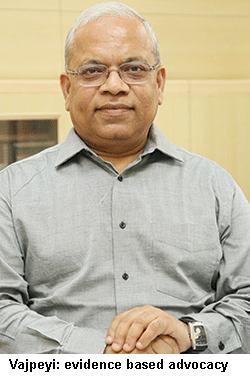 planning programmes is detailed,” says Alok Vajpeyi, an alumnus of Allahabad University and the Maastricht School of Management, Netherlands with widespread research and management experience in Oxfam, Lucknow (1992-99), Nobel Laureate Kailash Satyarthi’s Global March Against Child Labour (2001-08) and the US-based Catholic Relief Services (2008-11). Currently Vajpeyi heads PFI’s five-member strong knowledge management and core grants team (see p.69).
planning programmes is detailed,” says Alok Vajpeyi, an alumnus of Allahabad University and the Maastricht School of Management, Netherlands with widespread research and management experience in Oxfam, Lucknow (1992-99), Nobel Laureate Kailash Satyarthi’s Global March Against Child Labour (2001-08) and the US-based Catholic Relief Services (2008-11). Currently Vajpeyi heads PFI’s five-member strong knowledge management and core grants team (see p.69).
Since PFI’s canvas is broad, the multiplicity of its partners who include the health and family welfare ministries of the Central and state governments, Ngos and individuals engaged in social activism and projects relating to reproductive health, women’s education and empowerment being implemented across the country, is large and growing. Thus there is considerable synergy between PFI’s various divisions.
The family planning advocacy vertical is headed by Sweta Das, an English and advertising postgrad of Utkal University with work experience in HTA, Doordarshan, the International Aids Vaccine Initiative, and Future Group.
“We work with the health and family welfare ministries of the Central and state governments, sharing information 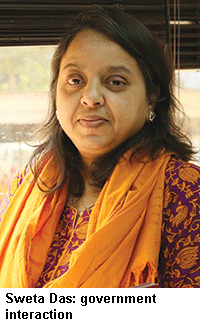 about techno-managerial developments and options available in family planning — the various types of contraception options and the relative merits and downsides of each. This type of information and advice is very useful to government departments and ministries because India hasn’t introduced any new contraceptives for over 30 years until recently, when injectables and the weekly pill were made available to the public. Moreover, we also advise the Centre and states on policy issues such as discouraging family planning camps where quality of services is generally poor, and the advantages of providing contraceptive options on fixed days in PHCs (primary health centres), besides advocating change of male attitudes towards family planning, and creating awareness among women — who constitute 78 percent of the population using contraceptive devices — that they need to become actively involved in family planning and reproductive health issues,” says Das.
about techno-managerial developments and options available in family planning — the various types of contraception options and the relative merits and downsides of each. This type of information and advice is very useful to government departments and ministries because India hasn’t introduced any new contraceptives for over 30 years until recently, when injectables and the weekly pill were made available to the public. Moreover, we also advise the Centre and states on policy issues such as discouraging family planning camps where quality of services is generally poor, and the advantages of providing contraceptive options on fixed days in PHCs (primary health centres), besides advocating change of male attitudes towards family planning, and creating awareness among women — who constitute 78 percent of the population using contraceptive devices — that they need to become actively involved in family planning and reproductive health issues,” says Das.
A notable feature of PFI’s activities and initiatives is that over the past almost 50 years it has established good relations with successive governments at the Centre and in the states, and works in close cooperation with them. Unlike some Ngos which prefer their wonders to perform under their own steam and tend to be contemptuous of incorrigible and often corrupt neta-babu driven social welfare agencies of government, PFI professionals and field activists work in close cooperation with good, bad and ugly government employees in far corners of the country, and motivate and persuade them to attain their common purpose. This is essentially the onus of the foundation’s community action and accountability vertical focused on helping state governments and Ngos to plan, implement and scale up community awareness and participation processes. Health, nutrition and sanitation committees formed at the village-level are central to improvement of health services in remote areas of rural India.
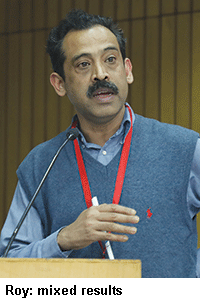 Bijit Roy, a political science graduate of Benares Hindu University with a Masters in rural development from the Xavier Institute of Social Service, Ranchi who served with CARE for almost a decade (1998-2007) promoting improved nutrition practices in the Naxal-infested districts of Bastar and Dantewada and signed up with PFI in 2008 as head of this vertical, is closely involved with the Union government’s National Rural Health Mission promoted in 2005, covering 353 districts countrywide. “PFI provides guidance and technical support to state governments to enable them to roll out and scale up Community Action for Health programmes. We believe improved maternal health, nutrition and sanitation practices are intimately connected with the improved status of women and bring us closer to our objective of good health and well-being for the people through better reproductive health practices. The results are mixed. In some states such as Maharashtra, Assam and Chhattisgarh where education standards are high, results are good. In north Indian states where primary education is backward and neglected, population stabilisation is still a major challenge,” says Roy.
Bijit Roy, a political science graduate of Benares Hindu University with a Masters in rural development from the Xavier Institute of Social Service, Ranchi who served with CARE for almost a decade (1998-2007) promoting improved nutrition practices in the Naxal-infested districts of Bastar and Dantewada and signed up with PFI in 2008 as head of this vertical, is closely involved with the Union government’s National Rural Health Mission promoted in 2005, covering 353 districts countrywide. “PFI provides guidance and technical support to state governments to enable them to roll out and scale up Community Action for Health programmes. We believe improved maternal health, nutrition and sanitation practices are intimately connected with the improved status of women and bring us closer to our objective of good health and well-being for the people through better reproductive health practices. The results are mixed. In some states such as Maharashtra, Assam and Chhattisgarh where education standards are high, results are good. In north Indian states where primary education is backward and neglected, population stabilisation is still a major challenge,” says Roy.
t cannot be gainsaid that almost half a century after it was promoted in a moment of national Malthusian panic, and with great hopes of applying strong brakes on the country’s runaway population growth, PFI has played an important role in keeping the family planning programme on the national agenda after the excesses of the Emergency. But it’s also true though that there are miles to go before the vision of its founder-philanthropist J.R.D Tata is fulfilled. Insightful sociologists ascribe the marginal impact of PFI on the country’s feeble population programme not only to the surprising disinterest of India Inc, but also to the foundation’s neglect to actively propagate the larger issue of universal primary education.
“Unfortunately, PFI’s advocacy and policy initiatives have been focused on techno-managerial issues and on advocacy of women’s empowerment to invest them with agency to make decisions about birth control. But unless adult literacy and primary education are universalised, there’s little chance of people accepting new contraception options or of women standing up to husbands and patriarchy, and becoming involved in family planning decisions. It’s no coincidence that total fertility rates are highest in the most under-educated states of India and below replacement level in most states of southern India where primary education standards and literacy are high. To attain its objectives of population stabilisation through women’s empowerment, PFI has to simultaneously champion formal primary education,” says a Bangalore-based academic who prefers to remain anonymous.
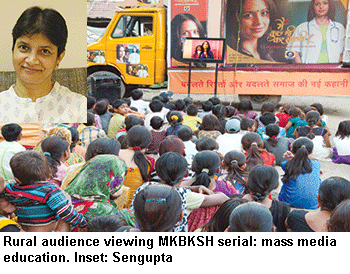 However, Tanushree Sengupta, an economics and mass communications postgrad of Delhi University with extensive experience of broadcast communications in Doordarshan, Spot Films, Delhi, the German embassy and German Information Centre, prior to signing up with PFI as senior manager of communications last year, argues that PFI is heavily involved with promotion of education, albeit not in the sense of promoting academic education.
However, Tanushree Sengupta, an economics and mass communications postgrad of Delhi University with extensive experience of broadcast communications in Doordarshan, Spot Films, Delhi, the German embassy and German Information Centre, prior to signing up with PFI as senior manager of communications last year, argues that PFI is heavily involved with promotion of education, albeit not in the sense of promoting academic education.
“Essentially, PFI is an advocacy, not an implementation organisation. But while admittedly, we haven’t been directly advocating universalisation of elementary education by way of curriculum reforms and monitoring academic learning, we are engaged in propagating education as the best contraceptive in a broader sense. Advocacy of a wide range of contraception options and reiteration of women’s right to participate in family planning decisions are education initiatives. Moreover we are perhaps the first Ngo to effectively use mass media to educate the public about reproductive health and family planning issues. Our television serial MKBKSH is infotainment — essentially an education programme — translated into 11 languages and also adapted for radio and broadcast by All India Radio. These programmes produced and directed by cinema professionals are supported by community radio broadcasts, toll-free interactive voice response systems, and have made a huge impact by way of educating the public about nutrition, drug abuse, contraception, and gender-based violence. I believe that through these activities, we have delivered education in a broader sense very effectively,” says Sengupta.
Undoubtedly with the huge success of MKBKSH, which unknown to most city-dwellers, has reached the message of family planning and women’s reproductive health deep into rural India, innovatively combining it with women’s empowerment, PFI has restored the taboo subject of birth control and population stabilisation on the national agenda. The fact that the prime language of this infotainment television serial — whose third season is imminent — is in Hindi, is also well thought out because birth rates are highest in the Hindi-speaking states of north India where the annual rate of population growth is well above the ideal TFR (total fertility rate) of 2.1, achieved in almost all states of peninsular India.
Little wonder Poonam Muttreja, the quietly determined executive director of PFI, is cautiously optimistic that the foundation’s strategy of propagating the family planning message under the broader umbrella of women’s rights and empowerment will reduce the national TFR to 2.1 within the next few years, rather than circa 2050 as predicted by most demographers. “India is already on the verge of achieving replacement level of 2.1 TFR. According to NFHS (National Family Health Survey 2015-16), the current TFR is 2.2 for the country as a whole. Already 24 states and UTs have achieved a TFR of 2.1 or below. It’s quite likely India will attain a national TFR of 2.1 by 2021-22 when the results of NFHS 5 will be published,” says Muttreja.
If indeed this miracle happens, three decades before the date predicted by doomsdayers, a substantial share of the credit for attaining this seemingly mission impossible should accrue to PFI, whose successive directors kept the logic and message of family planning alive during the dark days of the Emergency and subsequently when family planning became a taboo subject. Through sustained advocacy and other programmes, this Ngo continued to promote and spread the advantages of small families and issues such as women’s education, agency and rights.
That over the past quinquennium, PFI has ventured boldly into new digital media to successfully transmit its messages, is testimony to its ingenuity and creativity. Although this innovative public interest Ngo hasn’t received sufficient media attention and encomiums, there’s no denying it has played a stellar role in resuscitating the country’s endangered family planning programme whose near-death experience threatened to destabilise the Indian economy and society.
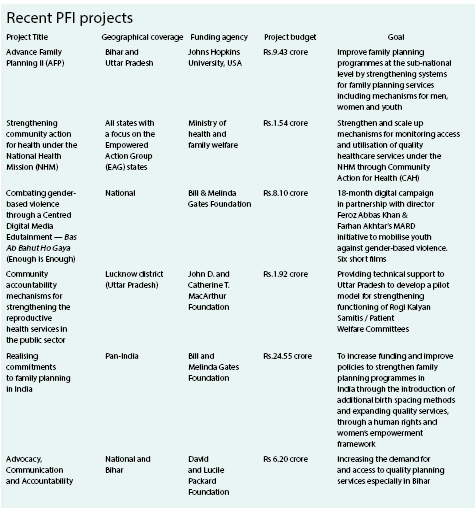
|
Population control: cost of inaction
A high priority item on the national agenda immediately after independence and in the 1960s when the FAO’s Club of Rome predicted a massive famine in Asia because of explosive population growth, birth control (aka family planning), through direct State intervention became a politically taboo subject in India after the Emergency (1975-77), when the Central and state governments forcibly sterilised millions of youth. Since then despite softer campaigns to propagate child spacing and planned parenthood through education and awareness, India’s population continues to grow by 15 million per year, imposing enormous burden on resources and impeding efforts to improve standards of living.
Alok Vajpeyi, an alumnus of Allahabad University and Maastricht School of Management, Netherlands, who is head of core grants and knowledge management at PFI, says unless the allocation for family planning which is a mere 4 percent of the annual National Health Mission budget of Rs.30,130 crore (2018-19), is urgently and sharply increased, the following consequences are inevitable.
• India will add 149 million to its current population of 1.28 billion by 2031 with Bihar (additional 24 million), Madhya Pradesh (14 million), Rajasthan (5 million) and Uttar Pradesh (31 million) together accounting for half of this population increase
• There will be 69 million additional child births in India with Bihar (13 million), Madhya Pradesh (9 million), Rajasthan (3 million) and Uttar Pradesh (18 million) together accounting for over 60 percent of births during this period
• There will be 2.9 million additional infant deaths and 1.2 million additional maternal deaths
• 206 million unsafe abortions can be averted particularly in Bihar (22 million) and Uttar Pradesh (34 million)
“The cost of inaction in family planning affects men and women not only in terms of their ability to plan their families, but also their overall well-being and capability to pay for the education of their children. Inaction in family planning can disturb growth equilibrium and result in huge loss to individuals, households, economy and society, with the most adverse consequences on the poorer states such as Bihar, Madhya Pradesh, Rajasthan and Uttar Pradesh,” says Vajpeyi.
|